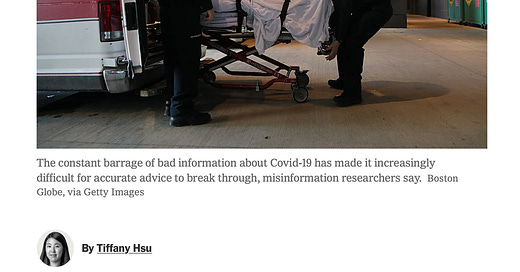A few days ago, on December 28, the New York Times published an article, “As Covid-19 Continues to Spread, So Does Misinformation About It” by Tiffany Hsu.
Hsu is a reporter on the technology team who covers “misinformation and disinformation,” according to her bio.
Her article reports that hospitalizations and deaths from COVID-19 are up across the country and that, at the same time, “myths and misleading narratives continue to evolve and spread, exasperating overburdened doctors and evading content moderators.”
“A Constant Barrage of Misinformation”
The 1500-word article laments the fact that there has been a “constant barrage” of misinformation on social media platforms, especially on Twitter. Hsu quoted several doctors, including Dr. Anish Agarwal, an emergency physician in Philadelphia, who’s concerned that some of his patients continue to believe “crazy” claims about Covid-19 vaccines, and Dr. Graham Walker, an emergency physician in San Francisco, who quit Twitter this month over his extreme frustration with Covid “misinformation.”

Hsu also quotes Megan Marrelli, the editorial director of Meedan, a nonprofit focused on digital literacy and information access:
“It’s easy to forget that health misinformation, including about Covid, can still contribute to people not getting vaccinated or creating stigmas. We know for a fact that health misinformation contributes to the spread of real-world disease.”
A preeminent, well-published, and brilliant senior scientist emailed me the New York Times article. She also sent it to several of our colleagues, including two medical doctors (one who recently retired from Harvard and another who has worked as a consultant for The World Bank and is an expert on Gulf War veterans’ illnesses), a philanthropist, and a professor at Boston University.
She was sharing the article with gusto because she found it absurd and inaccurate to the point of being amusing.
“This is a fun read,” my scientist colleague wrote, “NY Times rant on the COVID misinformation campaign.”
I read the article. Twice. We subscribed to the New York Times for years. And I’ve written several articles for them in the past. One of my dear friends, Timothy Williams, wrote for them for years before his untimely, age-inappropriate, and unexplained death on January 12, 2022.
Having Written for the New York Times, I Decided to Reach Out
Even though I’ve been disappointed with their coverage in the last three years, the New York Times is a newspaper that has enormous reach and influence. So I decided to reach out to the author and cc the executive editor of the New York Times, along with the news room.
Here’s a version of the letter I sent them via email:
Keep reading with a 7-day free trial
Subscribe to Vibrant Life to keep reading this post and get 7 days of free access to the full post archives.



